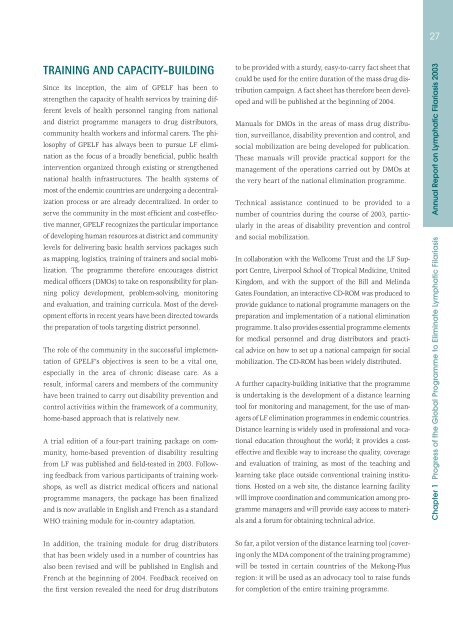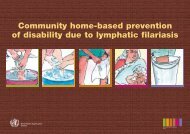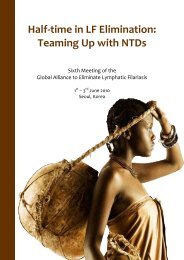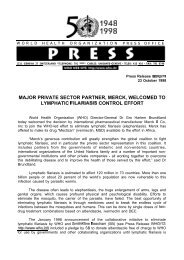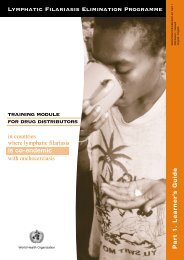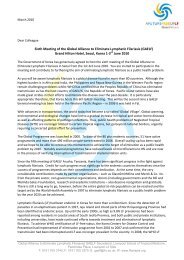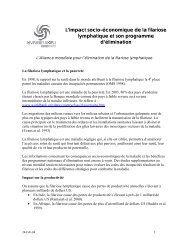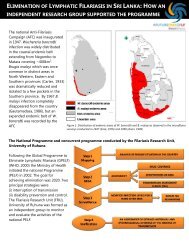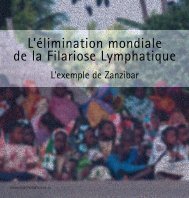Global Programme to Eliminate Lymphatic Filariasis ... - libdoc.who.int
Global Programme to Eliminate Lymphatic Filariasis ... - libdoc.who.int
Global Programme to Eliminate Lymphatic Filariasis ... - libdoc.who.int
You also want an ePaper? Increase the reach of your titles
YUMPU automatically turns print PDFs into web optimized ePapers that Google loves.
27TRAINING AND CAPACITY-BUILDINGSince its inception, the aim of GPELF has been <strong>to</strong>strengthen the capacity of health services by training differentlevels of health personnel ranging from nationaland district programme managers <strong>to</strong> drug distribu<strong>to</strong>rs,community health workers and informal carers. The philosophyof GPELF has always been <strong>to</strong> pursue LF eliminationas the focus of a broadly beneficial, public health<strong>int</strong>ervention organized through existing or strengthenednational health infrastructures. The health systems ofmost of the endemic countries are undergoing a decentralizationprocess or are already decentralized. In order <strong>to</strong>serve the community in the most efficient and cost-effectivemanner, GPELF recognizes the particular importanceof developing human resources at district and communitylevels for delivering basic health services packages suchas mapping, logistics, training of trainers and social mobilization.The programme therefore encourages districtmedical officers (DMOs) <strong>to</strong> take on responsibility for planningpolicy development, problem-solving, moni<strong>to</strong>ringand evaluation, and training curricula. Most of the developmentefforts in recent years have been directed <strong>to</strong>wardsthe preparation of <strong>to</strong>ols targeting district personnel.The role of the community in the successful implementationof GPELF’s objectives is seen <strong>to</strong> be a vital one,especially in the area of chronic disease care. As aresult, informal carers and members of the communityhave been trained <strong>to</strong> carry out disability prevention andcontrol activities within the framework of a community,home-based approach that is relatively new.A trial edition of a four-part training package on community,home-based prevention of disability resultingfrom LF was published and field-tested in 2003. Followingfeedback from various participants of training workshops,as well as district medical officers and nationalprogramme managers, the package has been finalizedand is now available in English and French as a standardWHO training module for in-country adaptation.<strong>to</strong> be provided with a sturdy, easy-<strong>to</strong>-carry fact sheet thatcould be used for the entire duration of the mass drug distributioncampaign. A fact sheet has therefore been developedand will be published at the beginning of 2004.Manuals for DMOs in the areas of mass drug distribution,surveillance, disability prevention and control, andsocial mobilization are being developed for publication.These manuals will provide practical support for themanagement of the operations carried out by DMOs atthe very heart of the national elimination programme.Technical assistance continued <strong>to</strong> be provided <strong>to</strong> anumber of countries during the course of 2003, particularlyin the areas of disability prevention and controland social mobilization.In collaboration with the Wellcome Trust and the LF SupportCentre, Liverpool School of Tropical Medicine, UnitedKingdom, and with the support of the Bill and MelindaGates Foundation, an <strong>int</strong>eractive CD-ROM was produced <strong>to</strong>provide guidance <strong>to</strong> national programme managers on thepreparation and implementation of a national eliminationprogramme. It also provides essential programme elementsfor medical personnel and drug distribu<strong>to</strong>rs and practicaladvice on how <strong>to</strong> set up a national campaign for socialmobilization. The CD-ROM has been widely distributed.A further capacity-building initiative that the programmeis undertaking is the development of a distance learning<strong>to</strong>ol for moni<strong>to</strong>ring and management, for the use of managersof LF elimination programmes in endemic countries.Distance learning is widely used in professional and vocationaleducation throughout the world; it provides a costeffectiveand flexible way <strong>to</strong> increase the quality, coverageand evaluation of training, as most of the teaching andlearning take place outside conventional training institutions.Hosted on a web site, the distance learning facilitywill improve coordination and communication among programmemanagers and will provide easy access <strong>to</strong> materialsand a forum for obtaining technical advice.Annual Report on <strong>Lymphatic</strong> <strong>Filariasis</strong> 2003Chapter 1 Progress of the <strong>Global</strong> <strong>Programme</strong> <strong>to</strong> <strong>Eliminate</strong> <strong>Lymphatic</strong> <strong>Filariasis</strong>In addition, the training module for drug distribu<strong>to</strong>rsthat has been widely used in a number of countries hasalso been revised and will be published in English andFrench at the beginning of 2004. Feedback received onthe first version revealed the need for drug distribu<strong>to</strong>rsSo far, a pilot version of the distance learning <strong>to</strong>ol (coveringonly the MDA component of the training programme)will be tested in certain countries of the Mekong-Plusregion: it will be used as an advocacy <strong>to</strong>ol <strong>to</strong> raise fundsfor completion of the entire training programme.


